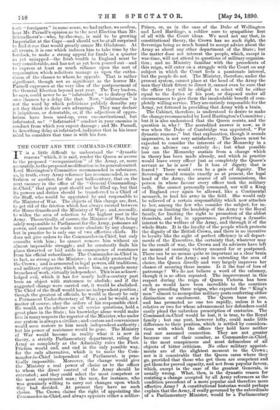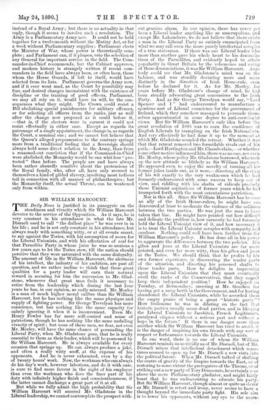THE COURT AND THE COMMAND-IN-CHIEF.
IT is a little difficult to understand the "dynastic reasons" which, it is said, render the Queen so averse to the proposed " reorganisation " of the Army, or, more accurately, to the proposed modification in its general control. Lord Hartington's Committee recommended in substance, as, in truth, every Army reformer has recommended, in one fashion or another, for the past half-century, that on the next vacancy in the office of the "General Commanding- 'in-Chief," that great post should not be filled up, but that its powers and duties should be transferred to a Chief of the Staff, who would be appointed by and responsible to the Minister of War. The objects of this change are, first, to get rid of the friction which has always existed between the Horse Guards and the Ministry of War; and, secondly, to widen the area of selection to the highest post in the Army. Theoretically, of course, the Minister of War, being solely responsible to Parliament for the Army, pasesses all power, and cannot be made more absolute by any change ; but in practice he is only one of two effective chiefs. He does not give orders to the Commander-in-Chief, but only consults with him ; he cannot remove him without an almost impossible struggle ; and be constantly finds his plans thwarted or laid aside in consequence of resistance from his official subordinate. The Commander-in-Chief is, iit fact, as strong as the Minister ; is steadily protected by the Crown ; and is armoured in legal powers, old traditions, and military etiquette, which make him, as regards many branches of work, virtually independent. This is an acknow- ledged evil, which it has for nearly half-a-century past been an object with statesmen to abolish ; and if the suggested change were carried out, it would be abolished. The Chief of the Staff would have no independent position ; though the greatest of officials, he would in theory be only a Permanent Under-Secretary of War ; and he would, as a matter of course, obey the orders of his responsible chief. He would, as the adviser on all service questions, hold a great place in the State ; his knowledge alone would make him in many respects the superior of the Minister, who under our system is always a civilian ; and. custom and convenience would soon restore to him much independent authority ; but his power of resistance would be gone. The Ministry 'of War would become in reality what it is now in theory, a strictly Parliamentary department, ruling the Army as completely as the Admiralty rules the Fleet. Friction would end, and end in the only possible way, for the only alternative, which is to make the Com- mauder-in-dhief independent of Parliament, is prac- tically impossible. Moreover, the change would give the Ministry a real power of choice as to the officer to whom the direct control of the Army should be entrusted ; and they could select the most competent or the most experienced man; the man, for instance, who was genuinely willing to carry out changes upon which they had decided. At present they have no such choice. The Crown claims the right of appointing the Commander-in-Chief, and always appoints either a soldier- Prince, or, as in the case of the Duke of Wellington and Lord Hardinge, a soldier sure to sympathise first of all with the Court ideas. We need not say that, in constitutional theory, the Crown has no such right, the Sovereign being as much bound to accept advice about the Army as about any other department of the State ; but the matter does not interest the people, which, except in war-time, will not attend to questions of military organisa- tion; and no Ministry familiar with the precedents of this reign, will enter on a struggle with the Court on any subject in which the Court feels a passionate interest, but the people do not. The Ministry, therefore, under the present system, cannot place at the head of the Army the man they think fittest to direct it, cannot even be sure that the officer they will be obliged to select will be either equal to the duties of his post, or disposed under all circumstances to give them the incalculable benefit of com- pletely willing service. They are entirely responsible for the Army, yet fettered in providing that Army with a brain. The Cabinet, therefore, is understood to desire to make the change recommended by Lord Hartington's Committee ; but it is also understood that the Queen resists, and the question is, why The accredited answer is now, as it was when the Duke of Cambridge was appointed, "For dynastic reasons ;" but that explanation, though it sounds impressive, is not very satisfactory. The Queen must be expected to consider the interests of the Monarchy in a way no adviser can entirely do ; but what possible loss can the Monarchy sustain from a change which in theory has been made already, and which in practice would leave every officer just as completely the Queen's servant as he is now ? Is it loss of dignity that is feared ? There would even be a gain of dignity. The Sovereign would remain exactly as at present, the legal head of the Army, the source of all commissions, the person in whose favour every officer took the military oath. She cannot personally command, nor will a King of England ever again be allowed, like a Continental monarch, to lead his army in the field. She would only be relieved of a certain responsibility which now attaches to her, among the few who consider the subject, for in- sisting on limiting the headship of the Army to the Royal family, for limiting the right to promotion of the ablest Generals, and for, in appearance, preferring a dynastic interest to the welfare of the Army, and through it of the whole State. It is the loyalty of the people which protects the dignity of the British Crown, and there is no incentive to loyalty like the sight of perfect efficiency in all depart- ments of the Executive, the certainty that, whatever may be the result of war, the Crown and its advisers have left no means of ensuring victory uncared for or postponed. There can be no means quite so important as a clear brain at the head of the Army; and in extending the area of choice, the Queen directly and very largely improves her chance of securing those means. Is it the fear of loss of patronage ? We do not believe a word of the calumny, though it is so often repeated. The improvement in this respect during the reign of Queen Victoria has been such as would have been incredible to the courtiers of the preceding three reigns, who expected the "King's men" almost to monopolise military posts conferring either distinction or emolument. The Queen bans no one, and has promoted no one too rapidly, unless it be a relative or two for whose advancement her defenders could easily plead the unbroken prescription of centuries. The Command-in-Chief would be lost, it is true, to the Royal family ; but one post, however lofty, could make little difference to their position, which is settled by considera- tions with which the offices they hold have neither real nor assumed connection. They are not greater because one of their number, as Commander-in-Chief, is the most conspicuous and most defenceless of all objects of bitter criticism. No other military appoint- ments are of the slightest moment to the Crown ; nor is it conceivable that the Queen cares where they go, provided that those who get them are competent and get them for proved capacity, and not from popular favour, which, except in the case of the greatest Generals, is usually wrong. What, then, is the dynastic reason for resisting a change accepted by all Army reformers as the condition precedent of a more popular and therefore more effective Army ? A constitutional historian would perhaps explain that the Army, if really governed by the subordinate of a Parliamentary Minister, would be a Parliamentary instead of a Royal Army ; but there is no actuality in that reply, though it seems to involve such a revolution. The Army is a Parliamentary Army now. It could not be held. together for a twelvemonth without the Mutiny Act, or for a week without Parliamentary supplies ; Parliament elects the Minister of War, whose power is theoretically com- plete; and Parliament can, if it pleases, veto the selection of any General for important service in the field. The Com- mander-in-Chief recommends, but the Cabinet approves, and modern history is strangely written if recent com- manders in the field have always been, or often been, those whom the Horse Guards, if left to itself, would have selected from its lists. Parliament governs the Army now, and if it ever went mad, as the Court by possibility may fear, and desired changes inconsistent with the existence of discipline or the training of good officers, Parliament, we may all rely on it, would have its will, be the con- sequences what they might. The Crown could resist a Bill abolishing special punishments for military offences, or for selecting all officers from the ranks, just as well after the change now proposed as it could before it, —that is, if the electors were in earnest it could not resist effectually in either case. Except as regards its patronage of a single appointment, the change is, as regards the Court, a nominal one ; and we cannot but believe that the Queen's alleged prepossession to the contrary springs more from a traditional feeling that a Sovereign should always hold some direct relation to the Army, than from a reasoned-out conviction that if the Command-in-Chief were abolished, the Monarchy would be one whit less" pro- tected" than before. The people are and have always been rather absurdly sensitive about the pretensions of the Royal family, who, after all, have only secured to themselves a kind of gilded slavery, involving most tedious toil in connection with all manner of philanthropies ; but the Monarchy itself, the actual Throne, can be weakened only from within.



































 Previous page
Previous page